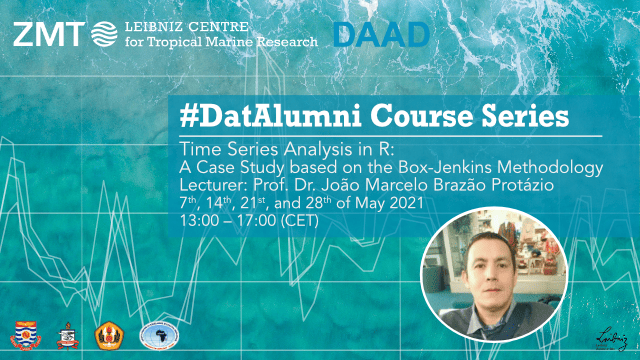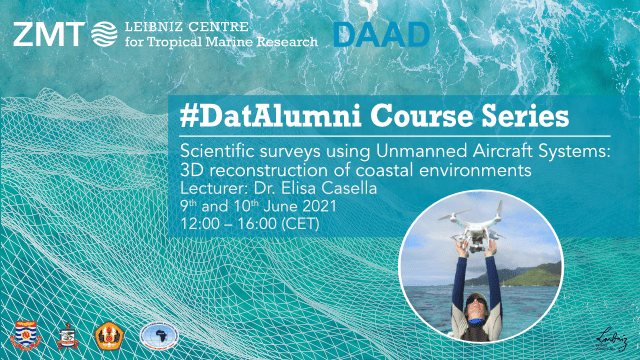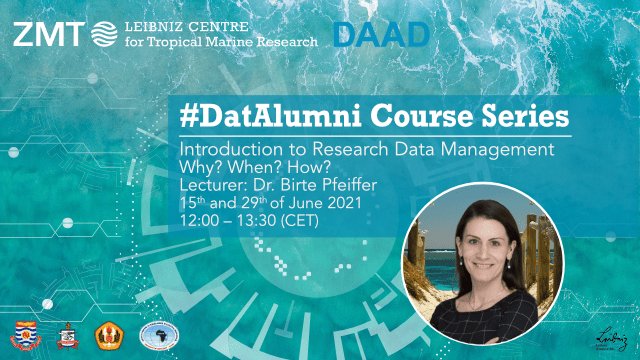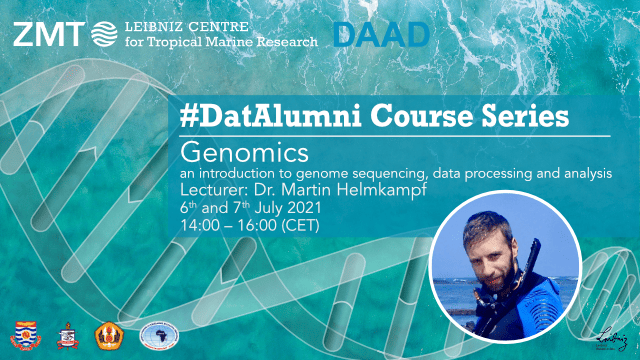The ZMT Academy, together with DigiZ and the Alumni Circle on Data Cooperation, has launched a series of courses that will take place in the coming months. The big topic of the course series is research data management and working with large data sets. Target group of the courses are ZMT Alumni and current doctoral candidates and postdocs as well as students from our international partner institutions. This course series is part of ZMT’s contribution to capacity development in the emerging fields of research data management and data science.
The activities are supported by the ZMT Academy Office for Alumni Relations and Digital ZMT initiative DigiZ. The course series takes place in the framework of the DAAD-funded project “DatAlumni – Scientific Data Cooperation with our Alumni Network”.
DatAlumni conveys basics and background in research data management, so that research data are FAIR and contribute to a reproducible, understandable and accessible global data basis. Jointly with the ZMT Alumni, ZMT wants to identify data management challenges within the different disciplines and national infrastructures and develop strategies and strengths for the management of research data. The ZMT Alumni become multipliers to promote the FAIR handling of data at their home institutes.
Course 1: Time Series Analysis in R: A Case Study based on the Box-Jenkins Methodology
When: 7, 14, 21, and 28 May 2021 | 13:00 - 17:00 (CEST)

The main idea of the course is to enable participants to fit a more appropriate model to temporally autocorrelated data and enabling them to make predictions about the phenomenon in question. The course will be given by ZMT Alumnus Prof. Dr. João Marcelo Brazão Protázio, who completed his doctoral studies at ZMT in 2007. He is now professor and Vice-Coordinator of the Postgraduate Program in Mathematics and Statistics at the Laboratory of Mathematical-Statistical Modeling at the University of Pará in Brazil. In 2019 he returned as a ZMT Alumni Fellow for some months to ZMT and acts as a member of the ZMT Alumni Circle on Data Cooperation.
Course 2: Scientific surveys using Unmanned Aircraft Systems: 3D reconstruction of coastal environments
When: 9 and 10 June 2021 | 12:00- 16:00 (CEST)

The aim of this workshop is to provide an introductory course to coastal scientists willing to explore the potential of Unmanned Aircraft Systems in their studies and using them consciously. This workshop also aims to introduce the photogrammetric method. The technique will allow participants to reconstruct the 3D environment of a scene and to measure 3D properties of objects in a given reference system using photographs. ZMT senior scientist Dr. Elisa Casella will give the course. Elisa is part of the working group DigiZ - Data Science and Technology and an expert in coastal monitoring methods using aerial vehicles and photogrammetry.
Course 3: Introduction to Research Data Management: Why? When? How?
When: 15 and 29 June, 2021 | 12:00 - 13:30 (CEST)

Workshop participants receive a general overview of research data management in all phases of the research cycle - from project planning and data analysis to data publication and archiving. In addition, participants will have the opportunity to delve into specific topics depending on their expertise and interest. Lecturer Dr. Birte Pfeiffer is a data curator in our DigiZ - Research Data Infrastructure working group. Register here.
Course 4: Genomics: An introduction to genome sequencing, data processing and analysis
When: 6 and 7 July, 2021 | 14:00 - 16:00 (CEST)

This course will provide a broad overview over the basics of genome research, aimed at researchers with little or no prior experience. The first session will cover how to plan a genome project, what sequencing technologies are out there, and what the basic workflow looks like. Practical exercises will include an introduction to the command line and how to process the raw data using bioinformatic tools. The second day will focus on more downstream steps, like genome assembly and annotation, and will end with a general discussion of best practices regarding data management and sharing. Dr. Martin Helmkampf is lecturing the course. Martin is a senior scientist and bioinformatician in the Fish Ecology and Evolution working group. Register here.
If you would like to be kept informed about upcoming courses, you can join the ZMT Alumni Network on LinkedIn or check out the ZMT Academy Courses Page on our website. You may also contact project coordinator Julian Lilkendey directly. (Backgroundphoto: Mudassir Ali, Unsplash; Vector graphics: Vecteezy)




